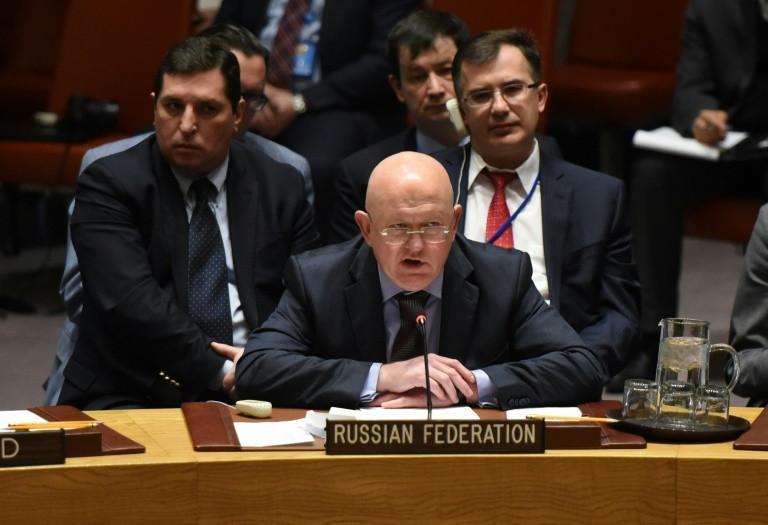Spy poisoning crisis deepens with UN duel
UNITED NATIONS

The international furor over the poisoning of a former Russian spy and his daughter intensified, with Russia warning Britain that it was “playing with fire.”
At a U.N. Security Council meeting on April 5, Russia’s U.N. Ambassador Vassily Nebenzia claimed that Russia was the victim of a hasty, sloppy and ill-intentioned defamation campaign by London and its allies.
Britain has blamed Russia for the March 4 poisoning of Sergei Skripal and his daughter. In response, more than two dozen Western allies including Britain, the U.S. and NATO have ordered out over 150 Russian diplomats in a show of solidarity. Moscow has fiercely denied its involvement in the nerve agent attack and expelled an equal number of envoys. The diplomatic turmoil has hit lows unseen even at the height of the Cold War.
Moscow assumes “with a high degree of probability” that the intelligence services of other countries are likely responsible for the incident, Nebenzia said at the U.N.
“Everything confirms this is a coordinated, very well-planned campaign” intended “to discredit and even delegitimize Russia,” he added.
Britain’s U.N. ambassador, Karen Pierce, shot back that Russia has come up with 24 theories on who bears responsibility for the poisoning, but the United Kingdom has only one - that it’s highly likely Russia was responsible.
Nebenzia refused to name the intelligence services that Russia suspects, but said their goal is to accuse Moscow of using “a horrible, inhumane weapon, of concealing the arsenal of this substance,” of violating the Chemical Weapons Convention, and putting in question Russia’s role “not only in finding a solution in Syria, but anywhere else.”
He warned: “We have told our British colleagues that you are playing with fire and you will be sorry.”
Britain’s Pierce said Russia’s 24 theories for the attack include blaming it on terrorists and saying Britain wanted to distract from Brexit, its departure from the European Union.
Earlier on April 5, Skripal’s 33-year-old daughter, Yulia, said in a statement released by British police that her “strength is growing daily” and she expressed gratitude to those who came to her aid when she and her father, Sergei, were found unconscious on a bench a month ago.
“I am sure you appreciate that the entire episode is somewhat disorientating, and I hope that you’ll respect my privacy and that of my family during the period of my convalescence,” she said in her first public comment.
The hospital in the English city of Salisbury confirmed that Yulia’s health has improved, while her 66-year-old father remains in critical condition.
Adding to the intrigue was a recording aired Thursday by Russian state Rossiya TV of a purported phone call between Yulia Skripal and her cousin in Russia. In the call, Yulia Skripal allegedly said she and her father were both recovering and in normal health, and that her father’s health was not irreparably damaged.
Skripal’s niece, Viktoria, confirmed the veracity of the recording in an interview with the BBC on April 6.
“It was Yulia. I have no doubt it was Yulia,” she told the BBC. “100 percent.”
Asked what her reaction was, she said, “You heard it in the recording. I couldn’t believe my ears.”
Moscow has steadfastly hammered away at Britain’s account of what befell the Skripals on March 4, especially the claim that their exposure to a Novichok nerve agent developed by the Soviet Union meant the attack was carried out by Russia.
During the Security Council meeting, Nebenzia questioned the British government’s claims of Russian responsibility by posing a series of questions.
He asked why the British policeman was affected by the nerve agent immediately when it took four hours for Skripal and his daughter to be affected. He asked what antidotes for exposure to Novichok the Skripals were given, where the Skripals were for four hours without cellphones on the day of the attack, and what happened to two cats and two guinea pigs in the Skripals’ house.
Russia has said it never produced Novichok and completed the destruction of its chemical arsenals under international control last year.
Nebenzia insisted that Britain is required to allow Russia to cooperate in the investigation.
“Great Britain refuses to cooperate with us on the pretext that the victim does not cooperate with the criminal,” he said. “A crime was committed on British territory, possibly a terrorist act, and it is our citizens who are the victims.”
He said both Skripal and Yulia are Russian citizens, and Moscow must be granted access to them.
Pierce said the U.K. has left it to Yulia to decide whether to give Russia consular access to her.
















